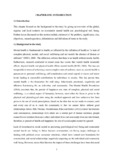Please use this identifier to cite or link to this item:
https://cris.library.msu.ac.zw//handle/11408/3928Full metadata record
| DC Field | Value | Language |
|---|---|---|
| dc.contributor.author | Sibanda, Theresi | - |
| dc.date.accessioned | 2020-12-01T10:28:02Z | - |
| dc.date.available | 2020-12-01T10:28:02Z | - |
| dc.date.issued | 2017-12 | - |
| dc.identifier.uri | http://hdl.handle.net/11408/3928 | - |
| dc.description.abstract | The purpose of this study was to explore how social capital can be used to promote psychological well being and community mental health. The study sort to establish how sense of community, collective efficacy, neighbouring and citizen participation which are the main variables of social capital impact on psychological well being and community mental health as measured among young adults in Mpopoma- Bulawayo. The rationale for the study was based on the observation that there was a high treatment gap, low identification of mental health problems and one treatment pathway drawn from the physiological perspectives. The main factor which seems to be the overall cause of these shortcomings has been largely attributed to low levels of mental health literacy and that there are no effective psychosocial well-being strategies across the ecological levels in the community. The significance of this study was to enable the creation of several pathways to addressing the social determinants of pathology among individuals and community to appreciate and implement effective well being strategies. Previous studies on social capital focused on the individual attributes of social capital in relation to individual well being. However, new trends in psychological well being and community mental health are directed towards social prescription, moving away from blaming the victim to strength based approaches with much emphasis being given to positive psychology. This study was mixed in nature (Quan-qual) in nature; non stratified and purposive sampling techniques were used in sampling respondents. The researcher used the scores from the standardized Social Capital Cohesion Scale (SCCS), which had an estimated an internal item correlation coefficients of the translated scales and a Cronbach alpha of (á=0.70). The major finding of this investigation was that social capital if properly and effectively utilized can have a strong impact on psychologically well being community mental health. The researcher therefore recommends the activation of social capital enabling policies across the community ecological levels for implementation of psychosocial interventions in addressing psychological well being and community mental health. Beyond this study the researcher recommends that a larger sample and various communities be used in order for the results to be effectively generalized. | en_US |
| dc.language.iso | en | en_US |
| dc.publisher | Midlands State University | en_US |
| dc.subject | social capital | en_US |
| dc.subject | investment | en_US |
| dc.subject | psychological well- being | en_US |
| dc.subject | community mental health | en_US |
| dc.subject | young adults | en_US |
| dc.title | Exploring social capital, an investment to psychological well- being and community mental health among young adults in Mpopoma- Bulawayo | en_US |
| dc.type | Thesis | en_US |
| item.openairetype | Thesis | - |
| item.languageiso639-1 | en | - |
| item.cerifentitytype | Publications | - |
| item.fulltext | With Fulltext | - |
| item.grantfulltext | open | - |
| item.openairecristype | http://purl.org/coar/resource_type/c_18cf | - |
| Appears in Collections: | Master Of Science In Community Psychology | |
Files in This Item:
| File | Description | Size | Format | |
|---|---|---|---|---|
| MCP DISSERTATION CHAPTER Printing.pdf | Full Text | 1.13 MB | Adobe PDF |  View/Open |
Page view(s)
280
checked on Feb 14, 2026
Download(s)
198
checked on Feb 14, 2026
Google ScholarTM
Check
Items in MSUIR are protected by copyright, with all rights reserved, unless otherwise indicated.



